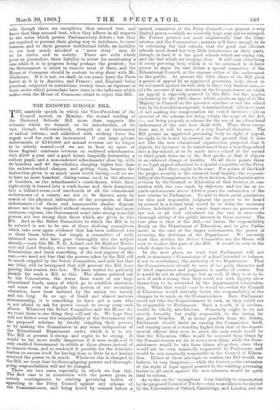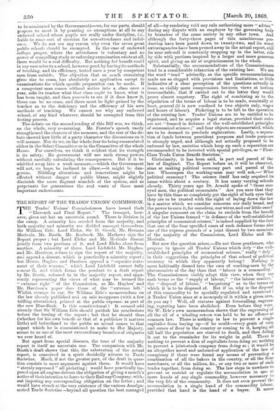THE ENDOWED SCHOOLS' BILL. THE ENDOWED SCHOOLS' BILL.
THE masterly speech in which the Vice-President of the Council moved, on Monday, the second reading of the Endowed Schools' Bill more than supports the estimate which we formed, on its introduction, of its vast, though well-considered, strength as an instrument of radical reform ; and exhibited with striking force the urgent need for such an instrument. If our large private endowments of £340,000 net annual revenue are no longer to be utterly wasted ;—if we are to 'hear no more of those flagrant contrasts between an endowed schoolmaster, with £300 a year and a good house, languidly instructing a solitary pupil, and a non-endowed schoolmaster close by, with 80 boarders and 40 day-scholars, charging higher fees than the endowed-school charges, and getting them, because the instruction given is so much more worth having ;—if we are to have no more boarders' dining-rooms used, in the absence of boarders, as the schoolmaster's coach-house, while their night-study is turned into a wash-house and their dormitory into a billiard-room ;—if one-fourth of all the educational endowments of a county are not to be thrown away by reason of the physical infirmities of the recipients of those endowments ;—if these and innumerable similar flagrant abuses are to be remedied without enormous delay and more enormous expense, the Government must take strong remedial powers, not less strong than those which are given in this Bill. And as the Select Committee to which the Bill is to be referred is not to be one of those shelving committees which take over again evidence that has been collected two or three times before, but simply a committee of wellinformed men who have gone thoroughly into the subject already, men like Mr. T. D. Acland and Sir Stafford Northcote and Lord Stanley, who were upon the Schools' Inquiry Commission, and know something of the real urgency of the case,—we need not fear that the powers taken by the Bill will be much crippled by the Select Committee, and still less that any delay will be interposed that will prevent the Bill from passing this session into law. We have waited too patiently already for such a Bill as this. The abuses pointed out by the Commission, the worse than waste of our large educational funds, many of which go to establish sinecures, and some even to degrade the system of our secondary education, have been endured by the nation too tamely and too long. In an age of timid and almost nervous statesmanship, it is something to have got a man who is not afraid to ask for power enough to sweep away such abuses. Whatever the Select Committee and the House do, we trust there is one thing they will not do. We hope they will not fritter away the responsibility of the Government for the proposed reforms, by fatally crippling their powers, or by making the Commission in any sense independent of the Educational Department under which it is to act. The Bill at present is strong, and ought to be strong. It would be far more really dangerous if it were weak,—if it only enabled Government to nibble at these abuses instead of
to remove them, and so rendered it possible for the Adminis tration to excuse itself for having done so little by not having received the power to do much. Whatever else is changed in the Bill, we trust that its thoroughgoing powers and thoroughgoing responsibilities will not be changed.
There are two cases. especially in which we fear this. The first case is in connection with the power given in certain contingencies to existing governing bodies of appealing to the Privy Council against any scheme of the Commissioners, and being heard by counsel before a special committee of the Privy Council ;—at present a very limited power,—which we earnestly hope may not be enlarged. Mr. Forster pointed out most emphatically that the Commission and the Commission's masters will have enough to do in reforming the bad schools, that the good and efficient schools need dread but very little interference on their parts, though, in fact, it is the good schools which are crying out, and the bad which are keeping close. It will ruin everything if every govering body which is to be reformed is to have power to argue its case before a special committee of the Educational Council, at the expense either of the endowment or the public. At present the 34th clause of the Bill gives a power of appeal by an aggrieved governing body, about to be reformed against its will, only in three very limited cases,— (1) On account of any decision of the Commissioners on which an appeal is expressly granted by this Bill; but this applies exclusively to the 18th clause, which grants an appeal to Her Majesty in Council on the question whether or not the school was by its foundation expressly denominational ; (2) on account of not making due compensation for vested interests ; (3) on account of the scheme not being within the scope of the Act, i.e., not being properly a scheme for the use of an educational endowment of the sort here dealt with. Thus, these exceptions are, it will be seen, of a very limited character. The Bill grants an aggrieved governing body no right of appeal, no right to be heard by counsel, on the ground that it does not like the now educational organization proposed, that it objects, for instance, to be transformed from a boarding-school into a day-school, or to be made into a school of the second or third grade from one of the first grade, or that it objects to an enforced change of locality. On all these points there is no legal appeal admitted to a special committee of the Privy Council. And there ought to be none. For points of this kind the proper security is the enforced local inquiry, the responsibility of the Commissioners for their decision, the administrative revision by the Council of Education of that decision in connection with the case made by objectors, and (so far as regards endowments above £100 a year) the submission of the new scheme to Parliament. To add to these great guarantees for wise and responsible judgment the power to be heard by counsel in a formal trial, would be to delay the necessary reform indefinitely, and to waste huge sums on processes of law not at all well calculated for the end in view—the thorough sifting of the public interest in these matters. The true plan is that of the Bill, to fasten the responsibility firmly on the Department of Education, and to give Parliament, in the case of the larger endowments, the power of reversing the decisions of the Department. We earnestly trust that neither the Select Committee nor the House will seek to weaken this part of the Bill. It would be ruin to the whole design to do so.
In the next place, we trust that Parliament will not seek to nominate a Commission of a kind intended to balance, if not to overbalance, the authority of the Department. That the Commissioners should be men of no party character and of tried experience and judgment, is matter of course. But it would be not an advantage, but an evil, if they were to be men of such a stamp that they could not with dignity allow themselves to be overruled by the departmental administra tion. What that would come to would be,—that the Council of Education would virtually throw the responsibility of the changes to be made on the Commissioners. Now, Parliament could not take the Commissioners to task, as they would not be responsible to Parliament. Such a result, it is obvious, would be wholly mischievous. Somebody ought to be not merely formally, but really responsible to the nation for any great blunder. If, as seems possible from the debate, Parliament should insist on naming the Commission itself, and naming men of a standing higher than that of the depart mental officers they were to serve, the only result would be that the Education Office would be screened from blame by the Commissioners set (as it were) over them, while the Com missioners would be safe from blame altogether, since they would not be even nominally responsible to Parliament, and
would be only nominally responsible to the Council of Educa
tion. Either of these attempts to weaken the Bill would, we believe, be very dangerous,—while the former,—the extension of the right of legal appeal granted to the existing governing bodies to all cavils against the new schemes, would be quite fatal to reform.
As to the cry for' exemptions ' from liability to examination by the proposed Council of Twelve—(six councillors to be elected by the Universities of Oxford, Cambridge, and London, and six
to be nominated by the Government)—we, for our parts, should propose to meet it by granting no exemptions at all to any endowed school whose pupils are really under discipline, i.e., liable to some sort of coercion for non-attendance and indolence. We do not see any reason why even the seven great public schools should be exempted. In the case of endowed colleges proper, where the attendance is voluntary and no power of compelling study or enforcing examination exists at all, there would be a real difficulty. But nothing but benefit could in any case arise to a school, however good, by having its methods of teaching, and its efficiency, tested once a year by competent men from outside. The objection that so much examining gives rise to cram, has absolutely no application except to examinations for which specific preparation can be made. If a competent man comes without notice into a class once a year, asks its teacher what that class ought to know, what it has been taught, and then proceeds to see if it does know it, there can be no cram, and there must be light gained by the teacher as to the deficiency and the efficiency of his own methods of teaching. We cannot see why any endowed school, of any kind whatever, should be exempted from this testing process.
The debate on the second reading of this Bill was, we think, on the whole, very re-assuring. Mr. Forster's speech vastly strengthened the chances of the measure, and the rest of the deflate showed how little of a party character the discussions on it will assume. Nor do we, on the whole, fear its being emasculated either in the Select Committee or in the Committee of the whole House. For ourselves, we think it evident that its strength is its safety. No government will use such strong powers without carefully calculating the consequences. But if it be whittled away into a weak measure,—which the Government will not, we hope, be inclined to allow,—it might be dangerous. Nibbling alterations and innovations might be effected without danger of public blame, might slightly diminish the more flagrant scandals of the system, and so perpetuate for generations the real waste of these most important endowments.



































 Previous page
Previous page